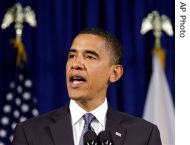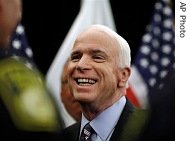-
(单词翻译:双击或拖选)
By Jim Malone
Washington
12 June 2008
A new public opinion poll shows Democrat1 Barack Obama leading Republican John McCain in the race for the White House by a margin2 of 47 to 41 percent. The Wall Street Journal-NBC News poll was conducted as the general election campaign between Obama and McCain gets underway after months of primary and caucus3 votes to choose the major party nominees5. VOA National correspondent Jim Malone has a preview from Washington.
Either man would make history if elected. Obama would become the first African-American president. If McCain wins, he would be the oldest candidate elected to a first term in the White House.
Both men had their share of challenges in clinching7 their party nominations9.
Obama was a newcomer to the national stage who was given little chance of defeating his heavily favored Democratic rival, Hillary Clinton.
 |
| Barack Obama speaks before a roundtable discussion about predatory lending at the Illinois Institute of Technology in Chicago, 11 June 2008 |
Obama's insurgent10 campaign successfully portrayed11 the first-term senator from Illinois as an agent of change.
"I am here to report that my bet has paid off," he said. "My faith in the American people has been vindicated12 because everywhere I go, people are standing13 up and they are saying, we are ready for change, we want something new, we want to turn the page and write a new chapter in American history."
The Wall Street Journal-NBC News poll found a majority of voters favor a president who will bring change over one who is more experienced and tested.
Despite that apparent advantage, Obama finds himself in a competitive race with Senator McCain.
 |
| John McCain smiles as he chats with law enforcement officers in Boston, Massachusetts, 12 June 2008 |
McCain ran an underdog campaign of his own to clinch6 the Republican nomination8, spurred by a comeback victory in the New Hampshire primary in January.
McCain emerged victorious14, despite lingering skepticism from some conservatives who doubt his commitment to their causes.
McCain will try to make the election about experience. McCain will cite his years of service in the military and in Congress, and he will question Obama's experience in national security and foreign policy issues.
McCain will also focus on his differences with Obama over the war in Iraq. Obama wants to begin withdrawing U.S. troops once he takes office, while McCain insists the United States must remain in Iraq until victory is achieved.
"We have incurred15 a moral responsibility in Iraq," he said. "It would be an unconscionable act of betrayal, a stain on our character as a great nation, if we were to walk away from the Iraqi people and consign16 them to the horrendous17 violence, ethnic18 cleansing19, and possibly genocide that would follow a reckless, irresponsible and premature20 withdrawal21."
The main battle lines of the general-election campaign are already becoming clear.
"The Democrats22 are going to say John McCain is George W. Bush's third term no matter how he tries to distance himself," explained longtime political observer Tom DeFrank of the New York Daily News, who was a guest on VOA's Issues in the News program. "And the Republicans are going to paint Barack Obama, in the words of one of them recently to me, as just another loony leftist, and they are going to try to paint him as an ultra-liberal, na?ve, inexperienced and therefore risky23 choice in a dangerous world. And I think that is how it is going to sort out, one way or the other."
While Obama leads McCain in the polls, he must shore up support among white men, suburban24 women and independent voters.
Meanwhile, McCain appears to be hurt by the generally negative views of President Bush in recent polls and the fact that about seven in 10 Americans believe the country is headed in the wrong direction, especially on economic issues.
"There is a general tilt25 to the Democrats in the election, which you see in all of the generic26 [polling] numbers, whether you ask about Congress or the presidency27, or President Bush's numbers," noted28 John Fortier, an expert on politics at the American Enterprise Institute, and a guest on VOA's Encounter program. "That is going to be tough for Republicans and John McCain. But, on the other hand, Republicans have ended up with a good nominee4, John McCain, who runs ahead of his party and might be able to make up some of those differences, and that is why I think we see a relatively29 competitive polling set of numbers between Obama and McCain."
Experts say Obama will have an advantage if he keeps the election debate focused on change and addressing the weak economy. McCain would prefer to focus on national security, the war on terrorism and the issue of experience.
Stuart Rothenberg is a non-partisan political analyst30 based in Washington. He also was a guest on VOA's Encounter.
"I think one of the key groups could be personality voters," he explained. "They are casual voters, they are younger voters, they are newer voters. They are going to get swept up in some of the Obama excitement, and this is a problem [for Republicans], people who want change. They do not even know what they mean by change, but they know they do not like the way things are now. I think this is the big Republican problem because while McCain will say that he favors change as much as Obama does, when you look at the two candidates and you look at the two parties, it is simply a harder argument for McCain to make."
Much of the general election debate is expected to focus on the domestic economy and the war in Iraq. Other issues that could figure prominently include terrorism, illegal immigration, the home mortgage crisis and the environment.
Obama is to be confirmed as the Democratic nominee at the national nominating convention in Denver in late August. McCain will be officially nominated at the Republican convention the following week in Minneapolis-St. Paul.
 收听单词发音
收听单词发音
1
democrat

|
|
| n.民主主义者,民主人士;民主党党员 | |
参考例句: |
|
|
|
2
margin

|
|
| n.页边空白;差额;余地,余裕;边,边缘 | |
参考例句: |
|
|
|
3
caucus

|
|
| n.秘密会议;干部会议;v.(参加)干部开会议 | |
参考例句: |
|
|
|
4
nominee

|
|
| n.被提名者;被任命者;被推荐者 | |
参考例句: |
|
|
|
5
nominees

|
|
| n.被提名者,被任命者( nominee的名词复数 ) | |
参考例句: |
|
|
|
6
clinch

|
|
| v.敲弯,钉牢;确定;扭住对方 [参]clench | |
参考例句: |
|
|
|
7
clinching

|
|
| v.(尤指两人)互相紧紧抱[扭]住( clinch的现在分词 );解决(争端、交易),达成(协议) | |
参考例句: |
|
|
|
8
nomination

|
|
| n.提名,任命,提名权 | |
参考例句: |
|
|
|
9
nominations

|
|
| n.提名,任命( nomination的名词复数 ) | |
参考例句: |
|
|
|
10
insurgent

|
|
| adj.叛乱的,起事的;n.叛乱分子 | |
参考例句: |
|
|
|
11
portrayed

|
|
| v.画像( portray的过去式和过去分词 );描述;描绘;描画 | |
参考例句: |
|
|
|
12
vindicated

|
|
| v.澄清(某人/某事物)受到的责难或嫌疑( vindicate的过去式和过去分词 );表明或证明(所争辩的事物)属实、正当、有效等;维护 | |
参考例句: |
|
|
|
13
standing

|
|
| n.持续,地位;adj.永久的,不动的,直立的,不流动的 | |
参考例句: |
|
|
|
14
victorious

|
|
| adj.胜利的,得胜的 | |
参考例句: |
|
|
|
15
incurred

|
|
| [医]招致的,遭受的; incur的过去式 | |
参考例句: |
|
|
|
16
consign

|
|
| vt.寄售(货品),托运,交托,委托 | |
参考例句: |
|
|
|
17
horrendous

|
|
| adj.可怕的,令人惊惧的 | |
参考例句: |
|
|
|
18
ethnic

|
|
| adj.人种的,种族的,异教徒的 | |
参考例句: |
|
|
|
19
cleansing

|
|
| n. 净化(垃圾) adj. 清洁用的 动词cleanse的现在分词 | |
参考例句: |
|
|
|
20
premature

|
|
| adj.比预期时间早的;不成熟的,仓促的 | |
参考例句: |
|
|
|
21
withdrawal

|
|
| n.取回,提款;撤退,撤军;收回,撤销 | |
参考例句: |
|
|
|
22
democrats

|
|
| n.民主主义者,民主人士( democrat的名词复数 ) | |
参考例句: |
|
|
|
23
risky

|
|
| adj.有风险的,冒险的 | |
参考例句: |
|
|
|
24
suburban

|
|
| adj.城郊的,在郊区的 | |
参考例句: |
|
|
|
25
tilt

|
|
| v.(使)倾侧;(使)倾斜;n.倾侧;倾斜 | |
参考例句: |
|
|
|
26
generic

|
|
| adj.一般的,普通的,共有的 | |
参考例句: |
|
|
|
27
presidency

|
|
| n.总统(校长,总经理)的职位(任期) | |
参考例句: |
|
|
|
28
noted

|
|
| adj.著名的,知名的 | |
参考例句: |
|
|
|
29
relatively

|
|
| adv.比较...地,相对地 | |
参考例句: |
|
|
|
30
analyst

|
|
| n.分析家,化验员;心理分析学家 | |
参考例句: |
|
|
|















